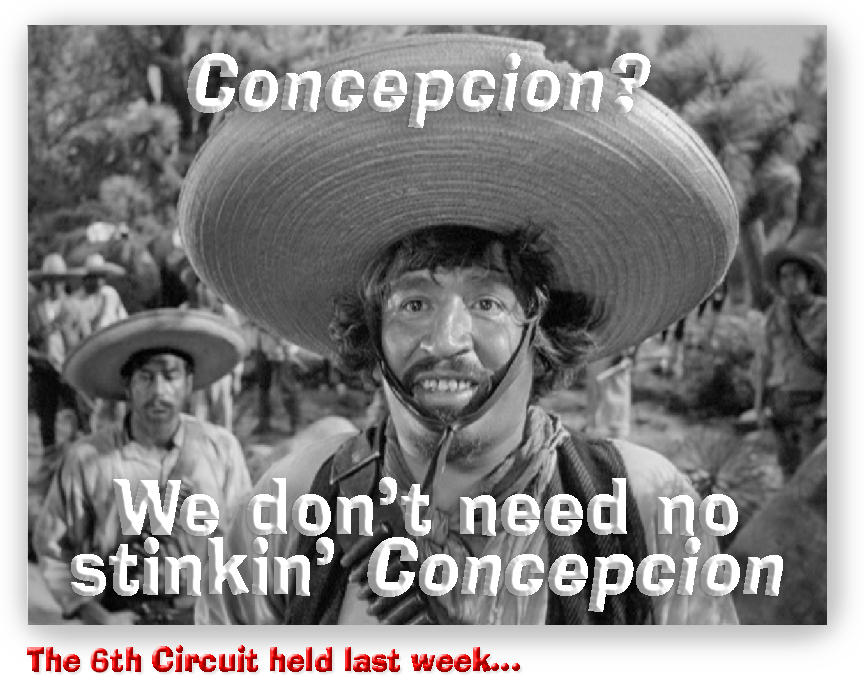We post news and comment on federal criminal justice issues, focused primarily on trial and post-conviction matters, legislative initiatives, and sentencing issues.
6TH CIRCUIT SAYS NOTHING IS ‘EXTRAORDINARY’ ABOUT CHANGES IN THE LAW
The 6th Circuit last week delivered a lengthy en banc decision that seems to fly in the face of last summer’s Supreme Court Concepcion v. United States opinion.
 Concepcion held by a 5-4 majority that “Federal courts historically have exercised… broad discretion to consider all relevant information at an initial sentencing hearing, consistent with their responsibility to sentence the whole person before them. That discretion also carries forward to later proceedings that may modify an original sentence. Such discretion is bounded only when Congress or the Constitution expressly limits the type of information a district court may consider in modifying a sentence.”
Concepcion held by a 5-4 majority that “Federal courts historically have exercised… broad discretion to consider all relevant information at an initial sentencing hearing, consistent with their responsibility to sentence the whole person before them. That discretion also carries forward to later proceedings that may modify an original sentence. Such discretion is bounded only when Congress or the Constitution expressly limits the type of information a district court may consider in modifying a sentence.”
Because Congress did nothing in the First Step Act to “contravene this well-established sentencing practice,” Justice Sotomayor wrote for the Concepcion majority, “Nothing in the text and structure of the First Step Act expressly, or even implicitly, overcomes the established tradition of district courts’ sentencing discretion.”
But last week, the 6th Circuit overcame that tradition right handily, ruling that in weighing a compassionate release motion, a district court may not consider non-retroactive changes in sentencing statutes or Guidelines, even when those changes mean that if the defendant were sentenced for the same offense today, the sentence would be much shorter.
David McCall, who has prior drug convictions aplenty, was convicted of serving as a middleman in a sprawling Cleveland, Ohio, drug-trafficking conspiracy. The government, emphasizing Dave’s extensive criminal history, urged the district court to sentence him to 235 months as a Guidelines career offender.
 Five years into the sentence, Dave moved for an 18 USC § 3582(c)(1)(A)(i) compassionate release, based on his risk of COVID, his rehabilitation and the fact that under the 6th Circuit’s United States v. Havis decision, attempted drug-trafficking offenses like Dave’s priors are not controlled substance offenses under the Guidelines career offender provision.
Five years into the sentence, Dave moved for an 18 USC § 3582(c)(1)(A)(i) compassionate release, based on his risk of COVID, his rehabilitation and the fact that under the 6th Circuit’s United States v. Havis decision, attempted drug-trafficking offenses like Dave’s priors are not controlled substance offenses under the Guidelines career offender provision.
Dave’s district court denied the compassionate release, holding that a nonretroactive change in the law like Havis was not an “extraordinary and compelling” reason for a sentence reduction under the statute. A year ago, a 6th Circuit panel agreed. Last week, the 6th Circuit sitting en banc upheld the panel decision:
The 1st, 9th, and 10th Circuits have held that nonretroactive legal developments can contribute to a finding of extraordinary and compelling reasons when viewed in combination with a defendant’s unique circumstances. The 4th Circuit’s position goes a step further… Different around the edges, all three of these decisions seem to rest on the common goals of ‘alleviating unfair and unnecessary sentences as judged by today’s sentencing laws… and of promoting ‘individualized, case-by-case’ sentencing decisions… We cannot reconcile this approach with the plain text of the compassionate-release statute. Congress prospectively amends or updates its criminal-penalty scheme. The nonretroactivity of judicial precedent like Havis is the rule, not the exception. That a defendant might receive a different sentence today than he received years ago represents the routine business of our legal system. These ordinary happenings cannot supply an extraordinary and compelling reason to reduce a lawful sentence whose term Congress enacted, and the President signed, into law.
The only good news is that within a month, the U.S. Sentencing Commission should issue a proposed USSG 1B1.13 – a new compassionate release policy statement – for public comment. The proposal should harmonize the rules followed by the different Circuits, and do so in a way favorable to prisoners.
United States v. McCall, Case No 21-3400, 2022 U.S. App. LEXIS 35473 (6th Cir, Dec 22, 2022)
– Thomas L. Root

